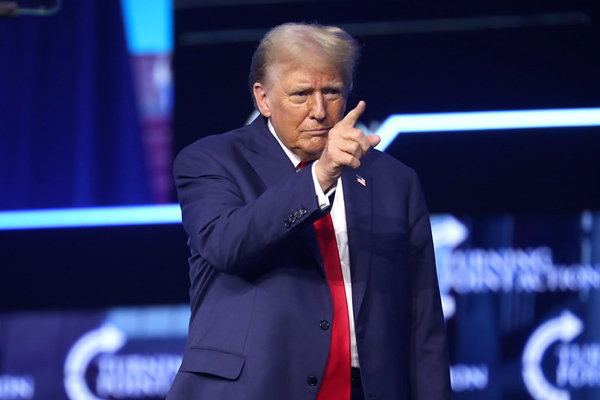If elected Donald Trump’s proposed tariffs would damage the economies of United States, China and Europe and set back climate action

New research by the Grantham Research Institute on Climate Change and the Environment at the London School of Economics and Political Science has found that proposed tariffs put forward by US Presidential Candidate Donald Trump would hit the American economy and could hinder action on climate change.
The research by Dr Aurélien Saussay, laid out in ‘The economic impacts of Trump’s tariff proposals on Europe’, concludes that Donald Trump’s additional tariffs on some imports could lead to a reduction in gross domestic product in the United States by -0.64%, China by -0.68%, and the European Union by a more modest reduction of -0.11%.
Mr Trump has proposed a 100% tariff on all imported vehicles which would, according to the paper, “significantly impact the affordability of electric vehicles in the US market, potentially slowing adoption rates and hampering efforts to reduce transport emissions, given that imported EVs currently account for approximately 30% of the US electric vehicle market.”
Donald Trump has repeatedly claimed in both speeches and media interviews that he is going to implement a universal 10% import tariff on all foreign-made goods, a targeted 60% import tariff on Chinese goods and a 100% tariff on all imported cars. He has also spoken about a 200% tariff on some imported vehicles. While most of the existing tariffs enacted under the previous Trump administration have not been rescinded by the Biden administration, these new proposals still represent a significant escalation of ‘America First’ trade policies and could have wide-ranging economic impacts.
Mr Trump’s proposed ramping up of tariffs, framed as measures to correct trade imbalances and protect industries in the United States, have the potential to significantly reshape international trade relations and supply chains, with notable consequences for the European Union and its trade priorities. The 10% universal tariff proposal would be the most damaging for European economies, even for countries less affected overall by the full set of proposals.
Some European sectors, particularly Germany’s automobile industry, would be disproportionately affected. Although the 100% tariff on vehicles is particularly targeted at Chinese electric vehicles, Germany would still be likely to experience an economic hit. The United States is the top destination for Germany’s exports, while it is only the fifth largest market for French exports.
The largest adverse effect of Donald Trump’s trade policies would be to China’s economy, with a projected loss of 0.68% of GDP. There would be limited impacts across the European Union but potentially substantially challenges for some Member States. Germany (-0.23%) faces a GDP drop more than twice as large as that for the European Union as a whole, while France and Italy would both sustain small impacts (-0.15% and 0.01%). The UK would suffer impacts (-0.14%) closer to the European average.
Compared with China, other major emerging economy countries, including India, Indonesia and Brazil, would be much less negatively affected, with GDP losses of -0.03%, -0.06% and -0.07% respectively, because they would only be subject to the 10% universal tariff instead of the specific 60% tariff targeted at China. They also have lower levels of trade with the United States compared with China and the European Union.
The paper recommends that European countries “refrain from using its carbon border adjustment mechanism (CBAM) as a conduit for retaliatory measures as it would require an unrealistically high carbon price on the embodied emissions of US imports and could weaken the acceptability of the border carbon tax for the EU’s trade partners.”
It adds that using the CBAM to retaliate to any increased tariffs “could in turn raise questions about the motives behind implementing the CBAM, which the EU has informally argued is justified under the WTO’s environmental exceptions.”
Dr Saussay also recommends that the European Union, China and other countries take a “measured response, limit exposure to avoid an overreaction to the proposals and avoid the pitfalls of broad retaliation as that could potentially trigger a full-scale trade war harming EU economies and consumers.”
The European Union and China should also “consider highly targeted protective measures for specific vulnerable sectors, such as the automobile industry. This is particularly relevant for Germany, and could include temporary subsidies, tax relief, R&D incentives, and support for export markets to diversify.”
Dr Aurélien Saussay, Assistant Professor at the Grantham Research Institute on Climate Change and the Environment, said:
“These tariffs will impact the American economy, not just Chinese and European sectors, so Donald Trump ploughing ahead with these policies if elected would be awful for economies across the globe.
“Retaliatory measures by China or the EU would likely worsen economic outcomes for all parties involved, potentially sparking a damaging trade war.”
ENDS

